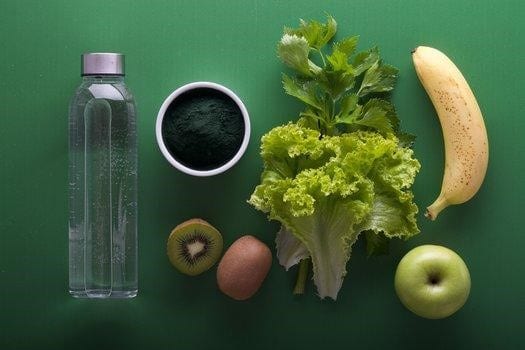By: Madison Boissiere, Undergraduate Student in Food Science and Human Nutrition at the University of Illinois Urbana-Champaign
The lining of our gut is filled with trillions of bacteria. These bacteria aid in our digestion, immune system, mood and behaviors, and our overall health. What we feed these bacteria can determine many factors associated with our health and wellness. Prebiotics and probiotics are key to a healthy microbiome and aid in the balance and promotion of good bacteria. But what exactly are prebiotics and probiotics?
Prebiotics
Prebiotics are plant fibers that promote the growth of healthy bacteria in the gut. Because the body does not digest fiber, prebiotics pass through the gut and act as food for the bacteria that make up our microbiome. Prebiotics are important for maintaining a healthy digestive system and boosting the immune system. Here are some examples of the most prebiotic-rich foods to add to your diet:
● Bananas
● Garlic
● Onions
● Leeks
● Asparagus
● Barley
● Oats
● Apples
Probiotics
Probiotics are the live strains of microorganisms that, when consumed, directly add to the bacterial population in the gut. By consuming probiotics, you create a healthy balance of microbes that aid in immune health, digestion, and many other factors that contribute to health.
Probiotics are found in foods such as:
● Yogurt
● Kefir
● Kombucha
● Kimchi
● Sauerkraut
Gut health and the immune system
One of the best ways to support your immune system is by consuming foods that will support your microbiome. Your gut consists of microbes that help with many functions to keep you healthy. Regulation of the immune system is one of those functions. Roughly 70% of cells contributing to the immune system are found in the gut. Together, they are able to produce an anti-inflammatory response to pathogens to send out the appropriate immune response.
Interestingly enough, the microbiome and the immune system have a bidirectional relationship, meaning our microbiota is responsible for developing and regulating the cells of our immune system. In contrast, the immune system aids in maintaining the integrity of the microbiome and the healthy bacteria that make it up.
Reasons for an unbalanced microbiome
Diet
● An unhealthy diet does not provide the necessary nutrients that microbes need to function. It can also cause harmful bacteria to overpopulate the gut.
Stress
● When the brain sends stress signals through the body, the nutrients and resources needed for the gut are sent to other parts of the body, leaving the gut depleted of essential nutrients for proper function and good health.
Medication
● Medications like antibiotics strip the gut of both harmful bacteria and good bacteria. In turn, this weakens the gut and takes away from the diversity of the microbiome.
How can I achieve a healthy microbiome?
Your gut is at its healthiest when there is a diverse range of microbes present to fight off pathogens and complete the functions necessary to keep you healthy.
Here are some ways to improve your gut diversity and support your immune system:
● Consume plant-based foods which are high in fiber. Frozen fruits and vegetables are just as good as fresh produce and an excellent long-term option during quarantine.
● Avoid processed foods
● Limit your intake of alcohol, salt, sweets, and sugary drinks
● Consume nuts, seeds, legumes, healthy fats, and lean meats and fish
● Include probiotic-rich foods in your diet, such as yogurt, kefir, kombucha, and kimchi
● Consume vitamins and minerals through a variety of different foods, especially vitamins A, C, E, and B6, which directly support healthy immune responses
● Exercise regularly
● Get enough sleep
The best thing you can do for your body is to take care of it through a balanced diet. The benefits are life-changing, and it will bring you comfort knowing you are setting yourself up for success against the potential pathogens you may face.
References
- “Eating to Support Gut Health and Immunity.” Covid Symptom Study, 28 May 2020, covid19.joinzoe.com/us-post/gut-health-immunity-covid.
- Madison, Annelise, and Janice K Kiecolt-Glaser. “Stress, depression, diet, and the gut microbiota: human-bacteria interactions at the core of psychoneuroimmunology and nutrition.” Current opinion in behavioral sciences vol. 28 (2019): 105-110. doi:10.1016/j.cobeha.2019.01.011
- Fields, Helen. “The Gut: Where Bacteria and Immune System Meet” Johns Hopkins Medicine,www.hopkinsmedicine.org/research/advancements-in-research/fundamentals/in-depth/the-gut-where-bacteria-and-immune-system-meet.
- “Prebiotics, Probiotics and Your Health.” Mayo Clinic, Mayo Foundation for Medical Education and Research, 27 Feb. 2021, www.mayoclinic.org/prebiotics-probiotics-and-your-health/art-20390058.
- Dennett, Carrie. “Probiotics and Immune Health – Today’s Dietitian Magazine.” Today’s Dietitian, Oct. 2020, www.todaysdietitian.com/newarchives/1020p30.shtml.
Photo by Unsplash















